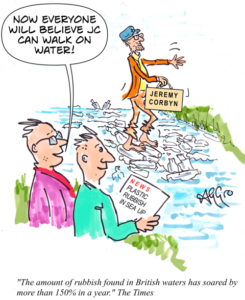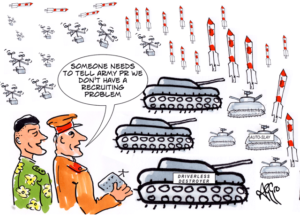16 November 2017
A Lens on the Week
UK

BREXIT: There is gang warfare in the Cabinet. Foreign Secretary Johnson and Environment Secretary Gove have got over the animosity caused by Gove undermining Johnson’s leadership bid and now stand back-to-back in their shared concern that the Government is not putting sufficient energy into the possibility of a “no deal” Brexit. They have written to Mrs May about it. Johnson is said to have referred to David Davis, Secretary of State for exiting the European Union, as a “fuckwit”. It is rumoured that Mr Davis does not care very much for Mr Johnson either.
Behind all this lies a genuine concern. The Johnson/Gove axis is concerned that a failure to develop a “new deal” exit leaves us vulnerable to an unfavourable “take it or leave it” from Mr Barnier. As a matter of negotiating strategy you can see the point. Mr Hammond, of course, is reluctant to see money spent on something which is unlikely to happen, but if he leaves expenditure on this too late we do risk falling into the negotiating trap. We will see what happens when the budget is revealed later this month.
The concerns of the Prime Minister are more immediate. How can she move the talks on to the all important issue of “future trading relationship” without putting more cash on the table? The next meeting of the EU is in December, and if no progress is made then, businesses will begin to run up against deadlines for moving functions and committing expenditure. One consequence of the emergence of the Johnson/Gove axis is that it sends the message that the Prime Minister does not have the power to put money on the table. That leaves the EU with the decision on whether to loosen their red line or to go for a “no deal” exit.
Meanwhile, back in the House of Commons, the EU Withdrawal Bill is now in Committee. The Government has conceded a final vote on the terms of Brexit, although it doesn’t mean much; by the time the vote is held the only alternative to the Government’s proposal will be “no deal”. Other contentious areas include the level of delegated legislation, whether we will continue to observe the EU Charter of Fundamental Human Rights, and whether our courts should continue to respect the right to damages for breach of European law.
MESS IN IRAN: Mrs Zaghari-Ratcliffe has become a political football. Actually that isn’t quite right, she already was one, serving five years in prison and facing further charges before Mr Johnson’s gaffe. His inaccurate comment that she was just teaching journalism was intended to be helpful but undermined her defence that when arrested she was on holiday in Iran. Now, although Mr Johnson has acknowledged his mistake, she is to be tried again.
The effect of this is to wrong foot the Foreign Office. No one makes their best decisions when they themselves have got things into a mess and there can be little chance of the Foreign Secretary approaching this dispassionately. It is hard to know how they feel in Tehran. Do they genuinely believe that Mr Johnson’s remarks confirm their previous suspicions or are they just delighted at the leverage they have achieved? Perhaps different factions see it different ways. Either way Mr Johnson has a difficult path to walk: on the one hand he must do enough to assuage public annoyance at his error. On the other, he must not be seen to make concessions to Teheran to cover his personal position.
Just when things are at their most difficult up steps his new ally Michael Gove to intervene. Gove has a fine brain and could be a great political reformer. Still, his judgement has proved faulty in the past and it is judgement which is needed now.

International
ZIMBABWE: The general is right – this is no coup d’etat, no overthrow of a legitimate, democratic government by the military; how could it be, when Zimbabwe isn’t a legitimate democracy but a one-party state? No, this is a good old-fashioned Game of Thrones power struggle within the ruling Zanu-PF party, between two potential successors to the 93 year old President Mugabe. The military supports Emmerson “The Crocodile” Mnangagwa (who was ousted as vice-president last week and fled the country in fear of his life) against rival Grace Mugabe, the president’s wife. Of course, the general could surprise us all by announcing free and fair elections to be held in six months time, open to all parties, not just Zanu-PF. But then again, world peace could break out this Christmas.
TRUMP IN THE EAST: The US president completed his twelve day tour of five far-eastern countries; Japan, South Korea, China, Vietnam and the Philippines.
He was allowed to carry on tweeting in China even though Twitter is banned in that country; a three-thousand year old civilization is wise enough to recognise the value of the saying “If your competitors insist on self-harming, don’t try to stop them” (which no doubt appears somewhere in Sun Tzu’s The Art Of War).
In the Philippines, Trump declared that he had “a great relationship” with President Duterte who’d prepared the ground a few days earlier by boasting about a murder he’d committed as a teenager (“I already killed someone. A real person, a rumble, a stabbing. I was just 16 years old. It was just over a look”) and criticising Barack Obama (“so black and arrogant”).
SAUDI ARABIA v IRAN: Having sent Qatar to Coventry earlier this year for its alleged pro-Iran tendencies, Saudi Arabia turned its anti-Iran attention this week to Lebanon and Palestine.
The Lebanese prime minister Saad Hariri announced his resignation, saying that the pro-Iran Hezbollah (the Tehran-sponsored Shia militia and terror group with which his own pro-Saudi faction shares power) is trying to take over the country. Mr Hariri made his announcement in Saudi Arabia and has not yet returned to the Lebanon, fuelling suspicions that his hand was forced by Riyadh and that he is being held there against his will.
The Palestinian president Mahmoud Abbas was summoned to Riyadh and, according to Israeli reports, was given an ultimatum by the Crown Prince: accept the proposals for an Israeli-Palestinian peace deal which is forthcoming from Washington, or resign. It’s thought that Riyadh hopes that a peace deal will clear the way for co-operation between Saudi Arabia and Israel against Iran, and stop Hezbollah from forming an alliance with the Palestinian group Hammas.
This week saw an escalation in the war in neighbouring Yemen between the Saudi-led coalition and the Iranian-backed Houthi rebels. The rebels launched a missile attack on Riyadh airport (it was intercepted by Saudi’s armed forces). In retaliation, the coalition forced the closure of all ports, airports and borders in Yemen and carried out two airstrikes on the Yemen capital Sanaa.

Financial
MUSHROOM SHAPED ACCOUNTING: The financial troubles of a French energy company may seem of minor concern to the British public; but when that company is EDF, Electricite de France, they could become a major problem indeed. EDF is one of those peculiar companies not uncommon in Europe, a public company also significantly owned (85% in this case) by the state. It is the largest electricity company in France, and bigger than any in the UK, in terms of both generation and retail customer service. EDF is profitable but it has been for some time cash flow negative, not a situation which it can sustain for ever, and various measures to cut costs – and a €4bn rights issue earlier this year – were intended to get income positive by early 2018. But EDF has now announced that this target remains elusive and that anticipated earnings are likely to be down on earlier forecasts for 2017. Its problems are partly weaker demand for electricity which it sells, but, much more significantly, enormous costs relating to its nuclear energy business. Top of the problem list is Britain’s Hinkley Point nuclear reactor, a super reactor which will, when (or if) built, supply around 13% of Britain’s electricity. The project is owned jointly with China National Nuclear Corporation. Although construction has finally started on site, the costs of the project remain somewhat hazy but may be approaching £25bn. Even with British government guaranteed prices for the output there could be further strain on EDF’s finances while the reactor is built (no income of course if the project does not get finished). EDF has problems in France too – a number of its reactors are currently closed pending safety and regulatory checks, a further potential hazard should Britain suffer a severe winter and need to import further supplies of power by the two cross channel cables. Log burning stove, anyone?
HOT HOT HOT…COLD: If you are buying a log burning stove, check if you can really afford one. House prices are continuing to rise, doubts about the economy and the hint of rising interest rates not withstanding – except for one location. That exception is the pricey flat market in Central London, now suffering from that classic trap – an enormously increased supply of new luxury residences, priced at exceptionally high levels, £2,000 per square foot plus (£3m to £4m for a two or three bedroomed flat), coinciding with a steep downturn in demand, and a steep decline in prices – 40% say some agents (off the record). The downturn is partly satiation – everybody who wants and can afford a luxury central London flat has already got one, and a nervousness to commit by foreign buyers until the terms of Brexit are settled. But over the rest of the country prices are still on the up, an average of 5% over the last year says the Office for National Statistics, reflecting what mortgage providers official surveys and estate agent’s unofficial commentaries are saying. That makes the average home price now £226,000 (double that in Greater London).
There are variations within this – some desirable seaside retirement areas are seeing rapid growth with competition from London retirees to buy retirement (or second) homes from very limited stock. Another area seeing strong growth is anything that can be afforded by first time buyers, where Help to Buy schemes are driving buyer’s ability to get on the ladder. Not so hot are Scotland and some areas of older stock around regional cities. Whether these are good or bad trends might depend on whether you are buying or selling; but in a time when affordability may come under pressure from slow earnings and rising interest rates (to say nothing of energy and food costs) it certainly has the potential for trouble in the future.
If you enjoyed this post please share it using the buttons above.
Please click here if you would like a weekly email on publication of the ShawSheet

